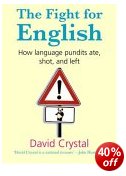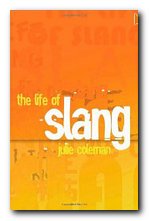how language pundits ate, shot, and left
David Crystal is a prolific writer on the subject of English language and the way it is used. His output ranges from scholarly works of reference such as The Cambridge Encyclopedia of Language, to popular studies of modern usage such as his recent Words, Words, Words which tries to keep track of concepts of language. This latest book The Fight for English is his defence of descriptive grammar. In a sense it’s his riposte to the very popular work by Lynne Truss, Eats, Shoots, and Leaves which knocked Harry Potter off the best-seller lists two or three years ago.
 She was arguing for an adherence to traditional notions of grammar and correctness. Crystal is here saying that language changes all the time and that there is nothing you can do about it. What he offers is a historical tour through what has been written about the English language. This tour takes him from AElfric in 1000 AD to the present. Our language started with a cultural mix of Latin, English, and French (with English very much at the bottom of the prestige table) but all the time it was absorbing an enormous number of loan words. (This is why the lexicon in English is bigger than other languages – and why there are so many irregularities of spelling and grammar.)
She was arguing for an adherence to traditional notions of grammar and correctness. Crystal is here saying that language changes all the time and that there is nothing you can do about it. What he offers is a historical tour through what has been written about the English language. This tour takes him from AElfric in 1000 AD to the present. Our language started with a cultural mix of Latin, English, and French (with English very much at the bottom of the prestige table) but all the time it was absorbing an enormous number of loan words. (This is why the lexicon in English is bigger than other languages – and why there are so many irregularities of spelling and grammar.)
The advent of printing began the process of standardisation – though it was hampered at first by lots of regional variations. Then early attempts at spelling reform were thwarted by lack of agreement between competing suggestions.
The first textbooks on grammar began to appear in the late sixteenth century and were followed by attempts to ‘regulate’ language via institutions such as the Royal Society. These too were unsuccessful – just as those of the Academie Francaise continue to be today.
Crystal has a high regard for Dr Johnson, compiler of the first really authoritative dictionary in English – but as he points out, even Johnson realised, after his monumental efforts to pin down the spelling and meaning of words, that language changes:
This is a lesson everyone who studies language eventually learns. You cannot stop language change. You may not like it; you may regret the arrival of new forms and the passing of old ones; but there is not the slightest thing you can do about it.
He makes what can be a complex issue easy to understand by breaking his argument down into separate short chapters – Standards, Grammar, Punctuation, Spelling – and so on. And he presents the whole development of English as a constant flux, with tensions between linguistic pedants and actual popular usage. It’s a process which he sees as self-correcting:
Languages seem to operate with an unconsciously held system of checks and balances. If a group of people go wildly off in one linguistic direction, using a crate of new words, eventually—if they want to continue as part of society and be understood by its other members—they will be pulled back, and they will drop some of their neologisms. At the same time, a few of the new words will have been picked upon by the rest of the community. And so a language grows.
He mounts a vigorous attack on prescriptive grammarians, then the same on the pronunciation police – demolishing all their pontifications with the same argument – that the ‘standards’ which they claim to be absolute are often either recent innovations, or are already out of date.
The latter part of the book is an assessment of the current state of English language teaching in schools, and an explanation of why he finds hope in the National Curriculum, which he helped to frame. This is a user-friendly book, written in a plain-speaking style, and his arguments are ultimately convincing. But he’s not as funny as Lynne Truss.
© Roy Johnson 2007
David Crystal, The Fight for English, Oxford: Oxford University Press, 2007, pp.256, ISBN: 0199229694
